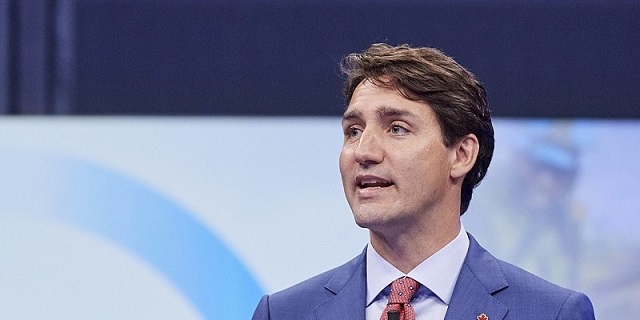Uncategorized
Messiah complex? Klaus Schwab declares unelected Davos elites as ‘trustees of the future’
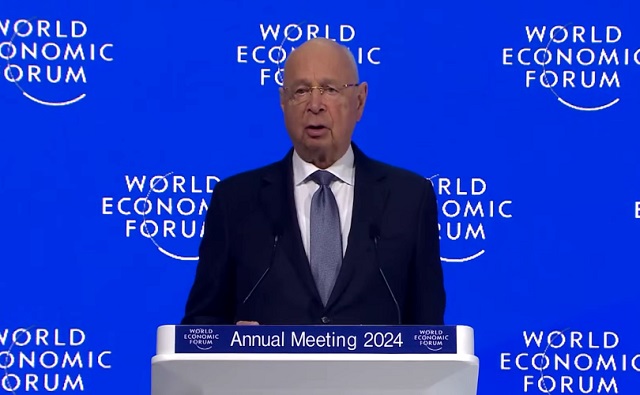
WEF founder Klaus Schwab delivers an address at the 2024 summit in Davos, Switzerland
From LifeSiteNews
The unelected globalists’ approach to rebuilding trust is to declare themselves trustees over the future of humanity.
In an effort to rebuild trust, World Economic Forum (WEF) founder Klaus Schwab appoints himself and the Davos crowd “trustees of the future” at the WEF annual meeting.
Kicking off the WEF annual meeting in Davos, Switzerland on Tuesday, Schwab focused on the theme of this year’s gathering, “Rebuilding Trust” while never once mentioning rebuilding the trust of private citizens.
READ: UN secretary-general calls for ‘global governance’ in ‘new multipolar order’ at 2024 Davos summit
“We have to rebuild trust – trust in our future, trust in our capacity to overcome challenges, and most importantly, trust in each other,” said Schwab, referring to the Davos crowd.
He then gave a rather peculiar definition of what “trust” means to him:
Trust is not just a feeling; trust is a commitment to action, to belief, to hope
Klaus Schwab, WEF: "We have to rebuild trust… most importantly trust in each other… Trust is a commitment to action, to belief, to hope… We must rediscover & embrace the narrative that has driven humanity since its inception – acting as trustees for a better future" pic.twitter.com/5N4khOQhWs
— Tim Hinchliffe (@TimHinchliffe) January 16, 2024
So, in Schwab’s eyes, trust means committing to action, believing, and hoping.
Therefore, every time Klaus Schwab says, “We have to rebuild trust,” what he’s actually saying is that the unelected globalists need to rebuild their own commitments to action through hope and faith.
How does Schwab and the Davos crowd hope to achieve trust (aka blind commitments to action)?
Why, a great narrative of course!
Schwab regurgitated the need to embrace the WEF’s Great Narrative Initiative, which was launched in November, 2021 as a follow up to the launch of the Great Reset agenda a year prior, stating:
We must rediscover and embrace the narrative that has driven humanity since its inception – acting as trustees for a better future.
Here, we see Schwab’s somewhat circular logic in emphasizing the need for unelected globalists to become stewards of the world.
In order “to rebuild trust” [faith-based commitments to action], “we” [unelected globalists], must act as “trustees.”
Great! And he says this believing this has been the narrative since humanity’s inception.
“The concept of trust and trusteeship compels us to think beyond borders and beyond our lifetimes,” said Schwab, adding, “It encourages collaboration over competition, sustainability over expediency, and empathy over apathy.”
He then appointed himself and everyone else at Davos “trustees of the future.”
In some circles, this is called having a messiah complex.
As trustees of the future, we are responsible for advancing a world which is richer in possibilities, more equitable in opportunities, and more secure in its foundations. Moreover, as leaders in government, business, and society, we bear a particular responsibility to rebuild trust in how we assume our own role as trustees.
Klaus Schwab, WEF: "As trustees of the future, we are responsible for advancing a world which is richer in possibilities, more equitable in opportunities.. As leaders in govt, business & society, we bear responsibility to rebuild trust in how we assume our own role as trustees" pic.twitter.com/GC670YqZ43
— Tim Hinchliffe (@TimHinchliffe) January 16, 2024
In other words, globalists are the ones responsible for rebuilding trust because they appointed themselves as trustees of our collective future.
Schwab concluded his speech by saying:
Trust is a fundamental pillar of our social, economic, and political lives. It is vital for cooperation, social cohesion, and effective, functioning institutions. To rebuild trust, there’s a fundamental need to embody trusteeship, which means to care for the greater good. Let’s use this annual meeting to rebuild trust by exercising our trusteeship individually and collectively for safeguarding the future of humanity and nature.
Klaus Schwab, WEF: "To rebuild trust there's a fundamental need to embody trusteeship, which means to care for the greater good. Let's use this meeting to rebuild trust by exercising our trusteeship individually & collectively for safeguarding the future of humanity & nature" pic.twitter.com/otC9QpHaEt
— Tim Hinchliffe (@TimHinchliffe) January 16, 2024
And with that, Schwab set the stage for the overlapping theme of rebuilding trust at this year’s WEF annual meeting in Davos.
To recap, rebuilding trust means “a commitment to action” by unelected, self-appointed trustees who act as stewards over our social, economic, and political lives.
It is the sort of elitist rhetoric that led to the people losing trust in their institutions long ago – “trust the experts, trust the science, have faith in institutions, don’t do your own research, critical thinking isn’t helping” – all of these phrases have been beaten to the point that anyone with eyes to see or ears to hear can spot the propaganda from a mile away.
Schwab’s brief speech is a continuation of the unelected globalists’ great reset agenda, coupled with the great narrative initiative meant to dictate how society and the global economy is run from the top-down by a group of unelected, self-appointed trustees who “care for the greater good” by “safeguarding the future of humanity and nature.”
Reprinted with permission from The Sociable.
Uncategorized
RCMP recruitment failure has Alberta advocacy group calling for Provincial Police Service

News release from Free Alberta Strategy (A Strong And Sovereign Alberta Within Canada)
“Make no mistake, we are paying for these services that we aren’t receiving. Alberta’s taxpayers are paying tens of millions of dollars for nearly 400 vacant RCMP officer positions – for boots that are not on the ground.”
A recent report from the Royal Canadian Mounted Police (RCMP)’s independent Management Advisory Board had findings that are nothing short of alarming:
“Federal policing has now arrived at a critical juncture of its sustainability, which present risks for the national security and safety of Canada, its people, and its interests,” says the report.
After over a year of diligent study, the Board has been tirelessly firing off flares, signalling to all who will listen: the very foundation of our national public safety apparatus may be at risk of faltering.
This is doubly problematic because, as you well know, the RCMP is also responsible for boots-on-the-ground policing in large parts of the country, including many rural and remote areas – including in Alberta.
Rural crime has been a longstanding issue in Alberta, and social disorder continues to make headlines nightly.
Alberta Minister of Public Safety, Mike Ellis, took to social media platform X (formerly known as Twitter) to express his opinion:
“The independent report finds the RCMP has struggled in recent years to recruit and retain regular members, a problem that’s particularly acute in federal policing. This is not about the hard-working men and women on the frontline: they are doing everything they can. The reality is the RCMP do not have enough officers to police communities in Canada effectively.”
Ellis has been ahead of this story for months now.
In March, Ellis stated that:
“… on average, Alberta has an RCMP officer vacancy rate of 20 per cent. This means that Alberta is only being served by 1,522 of the 1,911 RCMP officers that the federal government has authorized for Alberta.”
“Make no mistake, we are paying for these services that we aren’t receiving. Alberta’s taxpayers are paying tens of millions of dollars for nearly 400 vacant RCMP officer positions – for boots that are not on the ground.”
The consequences of this capacity crisis are far-reaching.
Not only does it jeopardize the safety of Albertans, but it also undermines the credibility of Canada’s federal police force on the international stage.
With limited resources and personnel, the RCMP’s ability to address pressing national and global security concerns is severely compromised.
The Management Advisory Board, created in 2019 by the federal government to provide external advice to the RCMP commissioner, set up a task force in the fall of 2022 to study the federal policing program.
Overall, the report says budget and personnel shortfalls have left the RCMP “operationally limited,” restricting the number of cases it can take on annually.
Here are some more highlights from the report:
“Canada and its people have already begun to see the repercussions of the federal policing program being stretched thin.”
“Federal policing’s overall eroding capacity may have implications for the credibility of Canada’s federal police force and its investigations on the international stage.”
“Ultimately, this may influence Canada’s overall approach and standing in international politics, including its ability to advance global priorities.”
Clearly, we cannot afford to wait any longer.
Municipalities can ease the burden on our national security services by establishing municipal policing.
Several cities in Alberta already have their own police authorities, and the provincial government is providing funding for others interested in exploring this option.
Grande Prairie is already in the process of establishing their own municipal police service.
No word on how many other municipalities have taken the government up on their offer.
Unfortunately, President of Alberta Municipalities Tyler Gandam (also Mayor of Wetaskiwin) is featured prominently on the National Police Federation’s “Keep Alberta RCMP” website.
Interestingly, the Keep Alberta RCMP website doesn’t mention the fact that the advisory board even exists.
It doesn’t mention the report.
The notion that our federal policing infrastructure teeters on the brink of instability while Gandam appears to be asleep at the wheel, is deeply disconcerting.
The safety and security of Albertans must remain our top priority.
We cannot afford to wait any longer.
The time has come for the province to take swift and decisive measures to bolster policing capabilities in Alberta.
It’s time for Alberta to seriously consider the establishment of an Alberta Provincial Police Service.
It has been one of the core tenets of the Free Alberta Strategy.
If you agree, please reach out to your municipality and ask them to take steps to protect your community.
Together, we can keep Alberta safe.
Regards,
The Free Alberta Strategy Team
P.S. We’re hoping you’ll consider contributing to our cause. Your generous donation helps us make a positive impact in our community. No need to worry about any hold-ups or threats here. We’re just passionate about making a difference, and your support goes a long way in helping us achieve our goals.
Uncategorized
Making Alberta a geothermal energy leader

Eavor announces it’s the #1 geothermal energy startup company in the world – January 2024
Alberta is creating Canada’s first geothermal test site to advance drilling innovation, reduce emissions and create jobs.
Geothermal energy uses naturally occurring heat within the earth to heat water and buildings and generate power, with few emissions or environmental impacts. Alberta has vast pockets of heat below ground, making the province Canada’s geothermal leader, but testing and developing new technologies can be a barrier for many companies. Unlike the United States, Japan and other countries, Canada does not currently have an open-access test site to help spur innovation.
Alberta is taking the first steps to create a new Alberta Drilling Accelerator. This groundbreaking facility would be the first of its kind in Canada, establishing Alberta as a global hub for geothermal technology. This will drive new innovations in geothermal and other clean energy projects that can reduce emissions and power communities around the world.
To kick-start the project, the Alberta government is investing $750,000 to conduct a feasibility study led by Calgary-based Eavor Technologies and other stakeholders. The study is the first step in assessing the proposed facility. It will include identifying a site, business planning, research on the governance model, an economic impact analysis and stakeholder engagement that will lay the groundwork for the initial planning stages of the project.
“Alberta has been a global energy leader for more than a century, renowned for our skilled workforce, innovation and one of the largest oil and gas reserves on the planet. The proposed Alberta Drilling Accelerator presents enormous potential to help our province lead the next wave of energy projects here at home and around the world that reduce emissions, create jobs and enhance energy security.”
The Alberta Drilling Accelerator would help companies test out and develop new geothermal drilling techniques or technologies to reduce emissions and drive growth across the clean energy sector. It would be an open-access, technology-agnostic drilling test facility capable of drilling in challenging environments, including deep depths, high temperatures and different rock types.
The accelerator also would help speed up the development of carbon capture, utilization and storage; helium; critical minerals; and other clean technologies and commodities that rely on Alberta’s drilling sector. All of this helps attract investment and bring new technologies to scale in Canada.
“With cumulative geothermal investment poised to reach $1 trillion by 2050, a geothermal arms race is very much underway to commercialize novel drilling techniques that accelerate geothermal development – exhibited by testing facilities in the United States, China and Iceland. As Canada’s first geothermal test bed, the Alberta Drilling Accelerator will help bring geothermal technologies to scale, supporting companies like Eavor. We commend the Government of Alberta for this bold initiative.”
“We are proud to witness Eavor, a CDL-Rockies alumni company, create new opportunities for innovators like themselves to advance the adoption of energy transition technologies like geothermal. The Alberta Drilling Accelerator will further solidify Alberta’s position as a leader in the global sustainable energy landscape.”
If the feasibility study shows the facility is economically and environmentally viable, and if the project is approved by the Alberta government, the facility will start taking shape at the selected site and drilling could start as early as 2025.
“Canada is home to the most advanced drilling technology in the world. Not only do our members support the responsible development of oil and gas, but we are integral in the extraction of new energy resources like geothermal and critical minerals. Our workers are at the epicentre of Canada’s energy transformation. Our people, technology and processes are leading the way towards a more diverse energy future. The Alberta Drilling Accelerator is a government-enabled policy approach to expand Alberta’s drilling capacity and reach its full potential as the world’s most diverse and technologically advanced producer and exporter of sustainable energy and critical minerals.”
“The Alberta Drilling Accelerator is a testament to Alberta’s innovative and entrepreneurial spirit. Leveraging our oil and gas sector expertise, Alberta is poised to become the global leader in developing new geothermal technologies that will play an integral role in reducing emissions while supporting job creation.”
Quick facts
- The Canadian Association of Energy Contractors estimates that one active drilling rig, whether drilling for natural gas or geothermal, creates approximately 220 direct and indirect jobs and
$1 million in tax revenue. - In 2019, Eavor received $2 million in provincial funding through Emissions Reduction Alberta and Alberta Innovates for the world’s first closed-loop geothermal system.
Related information
-

 Energy8 hours ago
Energy8 hours agoTech giants’ self-made AI energy crisis
-

 Business2 days ago
Business2 days agoOttawa should end war on plastics for sake of the environment
-

 Energy1 day ago
Energy1 day agoNew Report Reveals Just How Energy Rich America Really Is
-
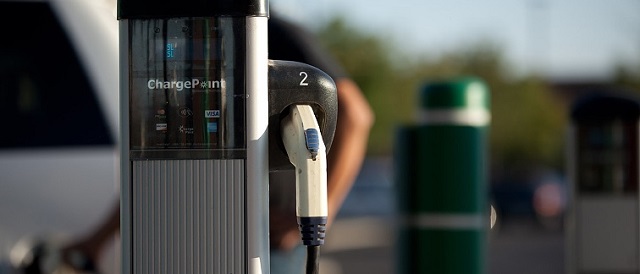
 Automotive1 day ago
Automotive1 day agoBiden’s Climate Agenda Is Running Headfirst Into A Wall Of His Own Making
-

 Economy1 day ago
Economy1 day agoFeds spend $3 million to fly 182 politicians and bureaucrats to climate conference
-
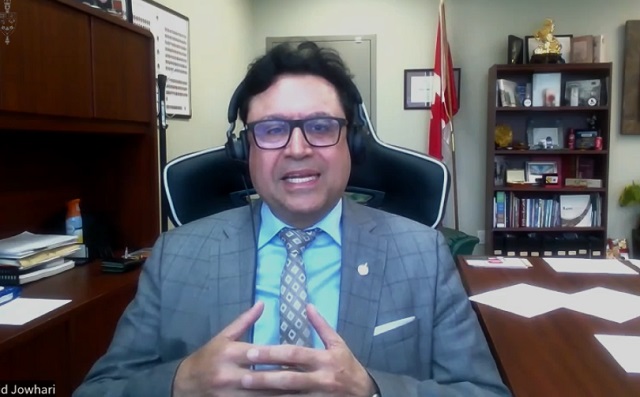
 Addictions17 hours ago
Addictions17 hours agoLiberals shut down motion to disclose pharma payments for Trudeau’s ‘safe supply’ drug program
-
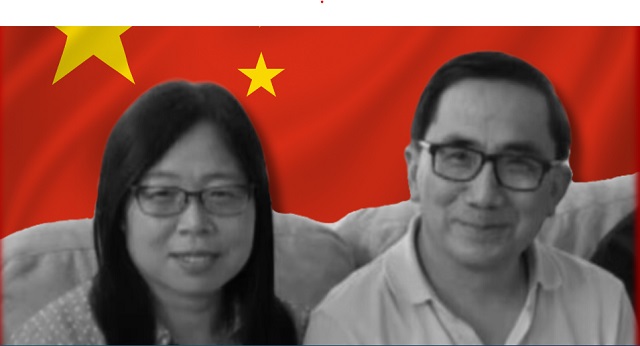
 espionage11 hours ago
espionage11 hours agoThe Scientists Who Came in From the Cold: Canada’s National Microbiology Laboratory Scandal, Part I
-

 Frontier Centre for Public Policy5 hours ago
Frontier Centre for Public Policy5 hours agoThe PM as Leaf’s coach


